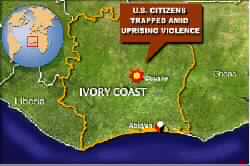U.S. troops arrived in West Africa Wednesday on a mission to protect Americans caught in Ivory Coast by a six-day military uprising that has left at least 270 dead. Bursts of gunfire and the sound of anti-tank rockets echoed through Bouake, Ivory Coast's second city, as loyalist troops and renegade soldiers fought gunbattles Tuesday.
Among those caught by the fighting in Bouake are 160 Americans, including scores of children at a school.
Airport sources in neighboring Ghana said a Hercules C-130 cargo plane had arrived with 53 people on board. They said another four planes carrying troops and equipment were expected soon at the airport in Accra.
The clashes in Bouake had died down by nightfall and renegade troops said they had beaten off an attack by the army.
There was no independent confirmation as terrified residents hid in their homes.
REGIONAL THREAT
The uprising, which started Thursday, has plunged the world's top cocoa producer into its worst crisis since independence from France in 1960 and threatened to send a surge of instability through the region.
French troops, on standby to rescue foreigners, sent a unit closer to Bouake from their 200-strong base in the capital Yamoussoukro, 60 miles south of the city and 150 miles north of the main city of Abidjan.
The Pentagon said it was moving forces to West Africa from its European Command to protect 2,000 to 3,000 Americans in Ivory Coast, which was once seen as a regional haven of peace.
A defense official said the force would go to Ghana first.
NEIGHBORS ACCUSED
Ivorian officials reiterated their belief that neighboring countries helped the rebels and said the government would lodge a complaint with the United Nations and African Union.
National assembly speaker Mamadou Koulibaly did not name any country, but Ivory Coast has in the past accused Burkina Faso of harboring dissidents.
Loyalist security forces at the weekend set fire to the homes of immigrants, mostly Burkina Faso nationals.
Burkina Faso has shut its border.
Ivory Coast also shares a border with war-scarred Liberia, where rebels bent on toppling President Charles Taylor have intensified their struggle in recent months.
As well as producing 40 percent of the world's cocoa crop, Ivory Coast is sub-Saharan Africa's third biggest economy, the engine of the French-backed West African CFA franc currency zone and a vital port for landlocked countries to the north.
A 1999 coup destroyed its stable reputation and hundreds died around turbulent 2000 elections.
But the current uprising is the first time the country has been split between heavily armed factions or slid to the brink of the kind of savage conflict that wrecked nearby Liberia or Sierra Leone.
To try to defuse the crisis, Morocco and Gabon invited African leaders to a summit in Marrakesh Thursday. The Economic Community of West African States regional bloc said its leaders would meet in Senegal Saturday to discuss the crisis.
There was no mention of the army mutineers, who say they are soldiers unhappy at being discharged in an efficiency drive, joining any peace talks
PHOTO CAPTION
Loyalist soldiers and rebels fought gunbattles in the blood-spattered streets of Ivory Coast's second city on September 24, 2002 as U.S. forces moved to protect Americans caught in a military uprising. Among those trapped in Bouake are 160 Americans, including scores of children. The U.S. said it was moving forces to West Africa to protect between 2,000 and 3,000 citizens in Ivory Coast. (MapInfo, NASA-Visible Earth/Reuters Graphic)
- Author:
News Agencies - Section:
WORLD HEADLINES


 Home
Home Discover Islam
Discover Islam Quran Recitations
Quran Recitations Lectures
Lectures
 Fatwa
Fatwa Articles
Articles Fiqh
Fiqh E-Books
E-Books Boys & Girls
Boys & Girls  Hajj Rulings
Hajj Rulings Hajj Fatwas
Hajj Fatwas














